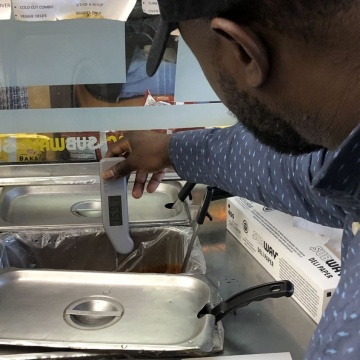Health Inspection Reports

Want to know how your favorite restaurant handles food safety? You can read our inspection reports. These reports tell you the conditions we saw at the time of inspection. Reports may not reflect corrective actions the establishment made, or the current condition.
Look up Health Inspection Reports
Food establishment reports include:
- Restaurants
- Grocery stores
- Delis
- Convenience stores
- Bars
- Worksite cafeterias
- Coffee shops
- Ice cream shops
- Catering kitchens
- Private organizations serving the public
They can be permanent, mobile, or seasonal.
Why We Do Health Inspections
We do health inspections to make sure establishments are handling food safely. When food is not handled safely, people can get sick from eating it.
How We Do Health Inspections
Routine Inspections
At least once a year we do a routine inspection of restaurants and retail food stores. They are usually unannounced. Our Sanitarians look at how food is handled, the temperature of the food, and the hygiene and health of employees. Sometimes we schedule inspections to make sure the appropriate staff will be there.
Reinspections
When we find health code violations on routine inspections, we do a follow up inspection.
Our inspection reports include:
- The restaurant or retail food store name
- Address
- Inspection date
- Type of inspection (i.e. routine or reinspection)
- Wisconsin Food Code number and section (definitions are in Chapter 1)
- What the health inspector observed
- The actions needed to correct the violation
Health Code Violations
The five most common violations that cause foodborne illness outbreaks are:
- Keeping hot or cold food at the wrong temperature
- Undercooking food
- Dirty utensils and equipment
- Poor personal hygiene
- Food from unsafe sources
Report a Health Code Violation
Types of Health Code Violations
Priority violations must be corrected immediately, or within a few days. If not fixed properly, they are more likely to cause foodborne illness. If these violations can’t be corrected during the inspection, a reinspection is required.
Core violations relate to cleaning and maintenance. Some examples are dirty floors and plumbing leaks.
"Repeat" means the violation was seen and documented on previous routine inspection reports.
"Corrected Onsite" means the violation was corrected during the routine inspection.
Please note: When you read a report, try not to focus on the number of violations, but on the types of violations. Remember that some priority violations may increase the risk for foodborne illness.
We do not score or grade health inspections.


